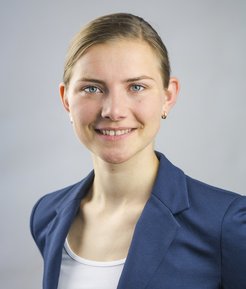Dr. Marie-Sophie Hartig
PostDoc in the “Space Interferometry” group

What is your current position at our institute?
I am a postdoc working at the AEI in Hannover (in the Space Interferometry group) and at the University of Florida.
What is your academic education?
- 10/2011-09/2015 : B.Sc. in mathematics with minor physics (Friedrich-Schiller-Universität, Jena, Germany)
- 09/2013-12/2013 : Study abroad (University of Eastern Finland, Joensuu, Finland)
- 10/2015-09/2017 : M.Sc. in mathematics with minor physics (Friedrich-Schiller-Universität, Jena, Germany)
- 01/2018-05/2022: Ph.D. candidate at the Max Planck Institute for Gravitational Physics Hannover
- since 06/2022: PostDoc at the Max Planck Institute for Gravitational Physics Hannover
- since 06/2023: One-year research stay at the University of Florida
Can you please describe your research?
Our aim is to measure gravitational waves in space. Since gravitational-wave signals are very small, highly sensitive technology had/has to be developed and all possible noises have to be understood and mitigated (by alignment if possible or in post processing). One of these noises is Tilt-To-Length (TTL) coupling. While using laser interferometry, we want to measure the path length changes of laser beams. If now these beams are reflected at tilted surfaces or the beams' origin rotates around some point, this couples into the length readout at the detector. This effect is called TTL coupling. In space missions it appears if freely floating mirrors (test masses) are misaligned or jitter or the spacecraft move themselves. During my PhD, I was characterizing the TTL coupling in LISA Pathfinder analytically. My current focus lies on the simulation and analysis of TTL coupling noise in LISA.
Please let us know why you chose the Max Planck Institute for Gravitational Physics for your research.
I first learned about gravitational waves in 2012. Since then I sought to learn more about gravitational wave science and also hoped to visit the laser interferometer in Ruthe. And I did so during an internship in 2014. That time I experienced the cooperative atmosphere at the institute and enjoyed being surrounded by people that were so enthused by the science going on that time (note that it was just a year before the launch of the technology demonstrator mission LISA Pathfinder and the first measurement of gravitational waves). So I was happy that I got the opportunity to come back after finishing my studies in 2017.
